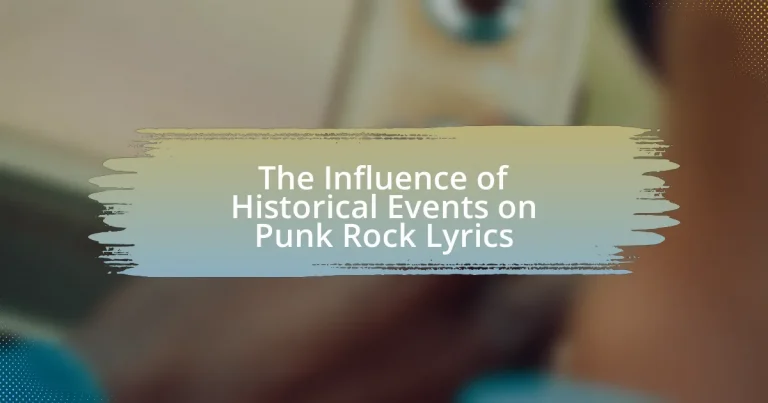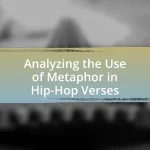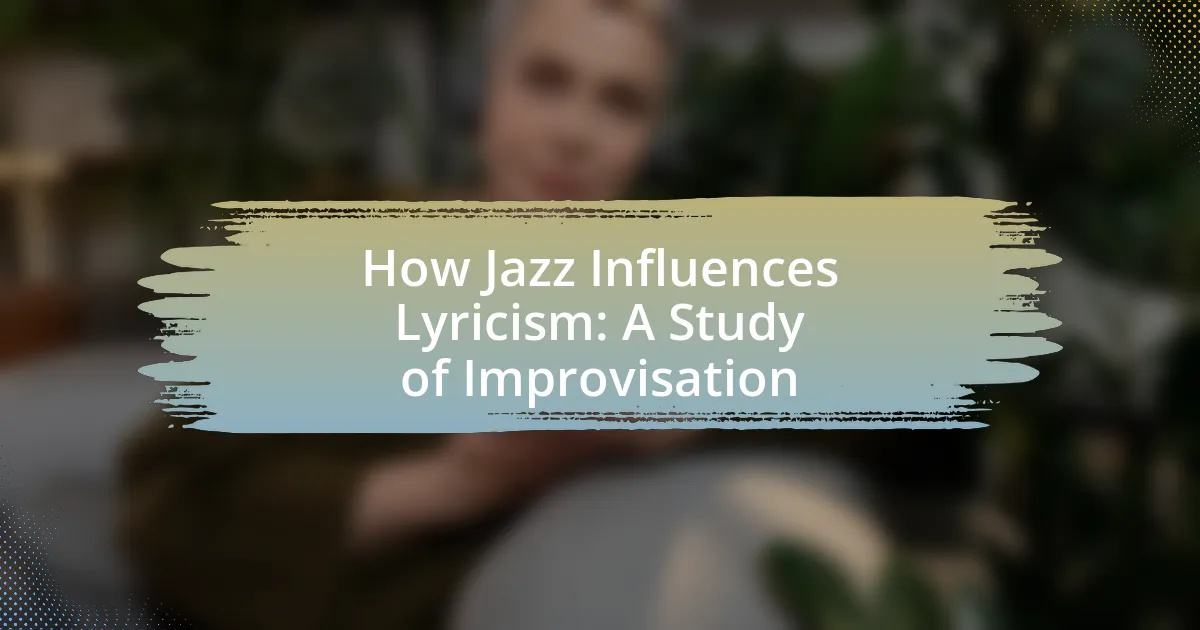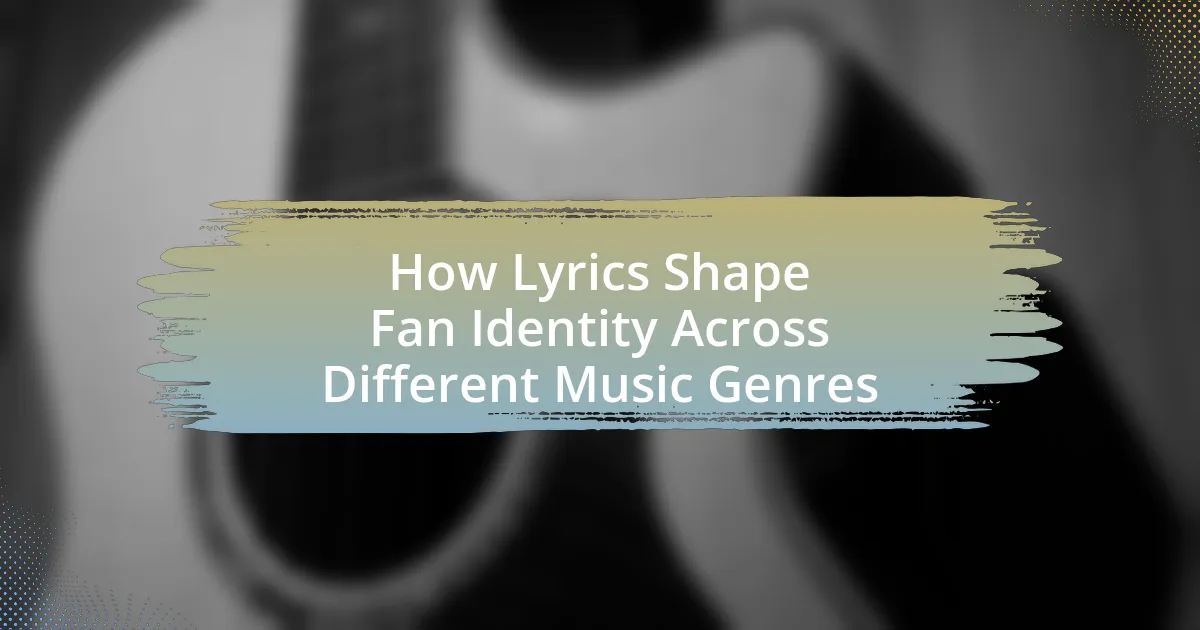The article examines the influence of historical events on punk rock lyrics, highlighting how social and political unrest shapes the themes and messages within the genre. It discusses the emergence of punk in the 1970s, driven by economic decline, government corruption, and social upheaval, with bands like The Clash and Sex Pistols addressing issues such as unemployment and anti-establishment sentiments. Key historical events, including the Vietnam War and civil rights movements, are analyzed for their impact on lyrical content, illustrating how punk rock serves as a powerful form of protest and commentary on contemporary issues. The article emphasizes the importance of understanding historical context to fully appreciate the urgency and relevance of punk rock lyrics.
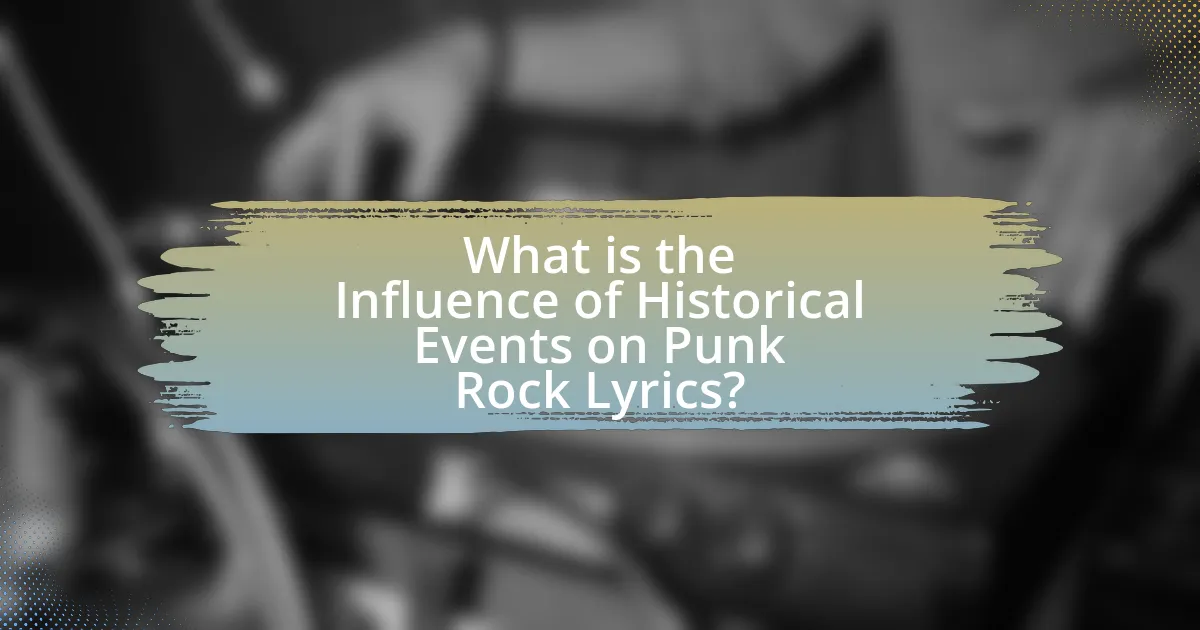
What is the Influence of Historical Events on Punk Rock Lyrics?
Historical events significantly influence punk rock lyrics by providing a backdrop of social and political unrest that artists respond to. For instance, the punk movement emerged in the 1970s during a time of economic decline, political corruption, and social upheaval, particularly in the United States and the United Kingdom. Bands like The Clash and Sex Pistols wrote lyrics that directly addressed issues such as unemployment, government oppression, and anti-establishment sentiments, reflecting the frustrations of youth during that era. The lyrics of songs like “London Calling” and “Anarchy in the U.K.” serve as concrete examples of how historical context shapes the themes and messages within punk rock music, making it a powerful form of protest and commentary on contemporary issues.
How do historical events shape the themes in punk rock lyrics?
Historical events significantly shape the themes in punk rock lyrics by providing a backdrop of social and political unrest that artists respond to. For instance, the rise of punk in the 1970s coincided with economic decline, political corruption, and social upheaval, particularly in the UK and the US. Bands like The Clash and Sex Pistols addressed issues such as class struggle, government oppression, and anti-establishment sentiments, reflecting the frustrations of youth during that era. The lyrics often serve as a critique of authority and a call for change, directly influenced by events like the Vietnam War, civil rights movements, and economic crises. This connection between historical context and lyrical content illustrates how punk rock serves as both a reflection and a reaction to the societal conditions of its time.
What specific historical events have had a significant impact on punk rock lyrics?
The Vietnam War significantly impacted punk rock lyrics, as artists expressed disillusionment with government and societal norms. The anti-war sentiment prevalent during the 1960s and 1970s fueled the punk movement, leading to lyrics that criticized authority and war. Additionally, the Watergate scandal in the early 1970s contributed to a growing distrust of political leaders, which punk bands like The Clash and Dead Kennedys reflected in their music. The economic struggles of the late 1970s, particularly in the UK, also inspired lyrics that addressed unemployment and social unrest, as seen in songs by bands like Sham 69. These events collectively shaped the raw, confrontational nature of punk rock lyrics, making them a voice for the marginalized and disenchanted.
How do punk rock artists interpret historical events in their lyrics?
Punk rock artists interpret historical events in their lyrics by using direct and often confrontational language to critique societal norms and political issues. For example, songs like “Holiday in the Sun” by the Sex Pistols address the impact of colonialism and the disillusionment with government actions. This approach allows artists to express anger and frustration towards events such as wars, economic crises, and social injustices, often reflecting the sentiments of marginalized communities. The use of vivid imagery and personal anecdotes in their lyrics serves to connect broader historical narratives with individual experiences, making the commentary both relatable and impactful.
Why is understanding the historical context important for punk rock lyrics?
Understanding the historical context is crucial for punk rock lyrics because it provides insight into the social, political, and cultural issues that influenced the genre’s emergence and evolution. Punk rock originated in the 1970s as a response to societal discontent, characterized by rebellion against authority and mainstream culture, reflecting events such as economic downturns, political unrest, and the rise of countercultural movements. For instance, the punk movement in the UK was significantly shaped by the economic struggles and high unemployment rates of the time, which are echoed in the lyrics of bands like The Clash and Sex Pistols. This historical backdrop allows listeners to grasp the urgency and relevance of the messages conveyed in the lyrics, making them more impactful and resonant.
How does historical context enhance the meaning of punk rock songs?
Historical context enhances the meaning of punk rock songs by providing a backdrop that informs the themes, emotions, and messages conveyed in the lyrics. For instance, the emergence of punk rock in the 1970s coincided with significant social and political upheaval, including economic recession, disillusionment with government, and rising youth counterculture. These factors influenced bands like The Clash and Sex Pistols, whose lyrics often addressed issues such as class struggle, anti-establishment sentiments, and personal freedom, reflecting the frustrations of a generation. The historical events surrounding the genre’s inception, such as the Vietnam War and civil rights movements, serve as critical references that deepen the listener’s understanding of the songs’ meanings and the urgency behind their messages.
What role does historical awareness play in the punk rock community?
Historical awareness plays a crucial role in the punk rock community by informing the genre’s themes, lyrics, and overall ethos. Punk rock emerged in the 1970s as a response to socio-political issues, with bands like The Clash and Sex Pistols drawing inspiration from historical events such as the Vietnam War and economic struggles in the UK. This awareness fosters a sense of identity and solidarity among punk rockers, as they often reference past injustices and movements in their music to critique contemporary society. For instance, the lyrics of songs like “London Calling” reflect the anxieties of a post-war world, illustrating how historical context shapes the punk narrative.
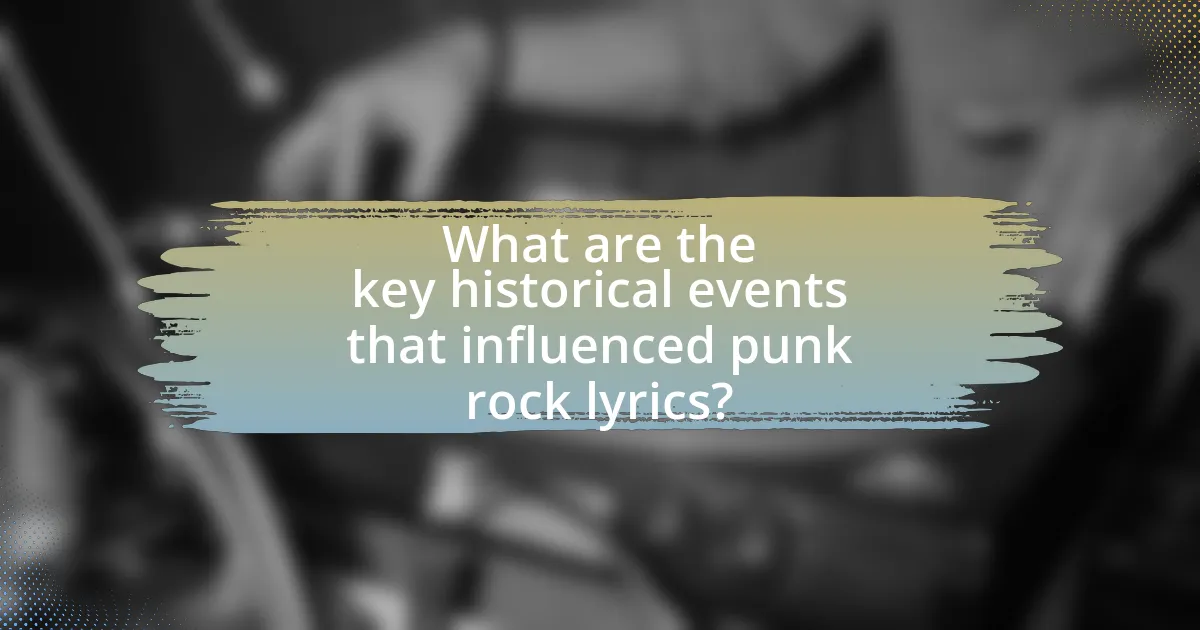
What are the key historical events that influenced punk rock lyrics?
Key historical events that influenced punk rock lyrics include the Vietnam War, the civil rights movement, and economic crises in the 1970s. The Vietnam War, which spanned from the late 1950s to 1975, generated widespread anti-war sentiment, reflected in punk lyrics that criticized government actions and military involvement. The civil rights movement of the 1960s and 1970s inspired punk artists to address issues of social justice, inequality, and systemic oppression in their music. Additionally, the economic downturns and high unemployment rates during the 1970s led to feelings of disillusionment and frustration among youth, which punk rock lyrics often expressed through themes of rebellion and resistance against authority. These events collectively shaped the raw, confrontational nature of punk rock, making it a voice for marginalized perspectives.
How did the political climate of the 1970s affect punk rock lyrics?
The political climate of the 1970s significantly influenced punk rock lyrics by fostering themes of rebellion, disillusionment, and anti-establishment sentiments. This era was marked by widespread social upheaval, including the Vietnam War, civil rights movements, and economic instability, which prompted punk musicians to express their frustrations and critiques of authority. For instance, bands like the Sex Pistols and The Clash incorporated direct references to political corruption, social injustice, and the failures of government in their lyrics, reflecting the anger and discontent prevalent among youth at the time. The punk rock movement emerged as a response to the perceived inadequacies of mainstream culture and politics, making its lyrics a powerful vehicle for social commentary and protest.
What specific political events inspired notable punk rock songs?
Notable punk rock songs have been inspired by specific political events such as the Vietnam War, the Watergate scandal, and the rise of authoritarian regimes. For instance, the song “Holiday in Cambodia” by the Dead Kennedys critiques Western consumerism while referencing the Khmer Rouge’s brutal regime during the Cambodian genocide in the 1970s. Similarly, “American Idiot” by Green Day emerged in response to the political climate during George W. Bush’s presidency, particularly the Iraq War and the perceived erosion of civil liberties. The song “Killing in the Name” by Rage Against the Machine addresses police brutality and systemic racism, reflecting the social unrest of the 1990s. These songs exemplify how punk rock serves as a reaction to significant political turmoil and societal issues.
How did the punk movement respond to governmental policies?
The punk movement responded to governmental policies through direct criticism and rebellion, often using music and art as platforms for protest. Punk bands like The Sex Pistols and The Clash articulated their discontent with political issues such as unemployment, police brutality, and government corruption in their lyrics. For instance, The Sex Pistols’ song “God Save the Queen” explicitly challenged the British monarchy and the establishment during a time of political turmoil in the 1970s. This response was characterized by a DIY ethos, where punks created their own media and organized grassroots movements to express dissent against perceived injustices.
What social movements have influenced punk rock lyrics?
Punk rock lyrics have been significantly influenced by various social movements, including anti-establishment sentiments, civil rights activism, feminism, and environmentalism. The anti-establishment movement, particularly in the 1970s, fueled punk’s rebellious spirit, as bands like the Sex Pistols and The Clash expressed discontent with government and societal norms. Civil rights activism, especially in the United States, inspired punk bands to address issues of racial inequality and injustice, as seen in the works of Bad Brains and other bands that incorporated reggae influences and themes of resistance. Feminism also played a crucial role, with bands like The Slits and Bikini Kill addressing gender inequality and advocating for women’s rights through their lyrics. Additionally, environmentalism emerged as a theme in punk rock, with bands like Propagandhi and Anti-Flag critiquing corporate practices and promoting ecological awareness. These movements collectively shaped the punk rock genre, making it a platform for social commentary and activism.
How did the civil rights movement shape punk rock themes?
The civil rights movement significantly shaped punk rock themes by introducing concepts of social justice, rebellion against authority, and the fight against systemic oppression. Punk rock emerged in the 1970s as a response to societal issues, and the civil rights movement’s emphasis on equality and activism inspired punk musicians to address themes of inequality, racism, and resistance in their lyrics. Bands like Bad Brains and The Clash incorporated messages of racial unity and anti-establishment sentiments, reflecting the movement’s influence. The punk ethos of challenging the status quo and advocating for marginalized voices can be traced back to the civil rights struggle, which sought to dismantle oppressive systems and promote individual freedoms.
What impact did the feminist movement have on punk rock lyrics?
The feminist movement significantly influenced punk rock lyrics by introducing themes of gender equality, female empowerment, and social critique. Punk rock artists began to challenge traditional gender roles and express women’s experiences, as seen in the works of bands like The Slits and Bikini Kill, who incorporated feminist messages into their songs. This shift was evident in lyrics that addressed issues such as sexual autonomy, misogyny, and the patriarchy, reflecting the broader societal changes initiated by the feminist movement in the 1970s and 1980s. The incorporation of these themes not only diversified the punk rock genre but also inspired a new wave of female musicians to voice their perspectives, thereby reshaping the cultural landscape of music.
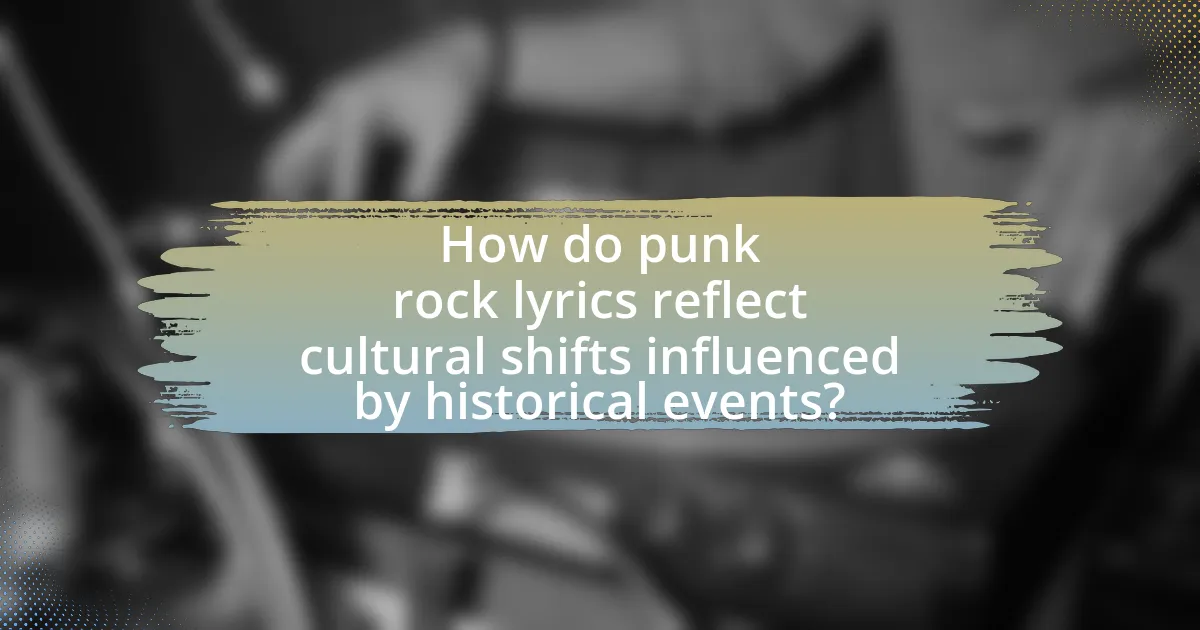
How do punk rock lyrics reflect cultural shifts influenced by historical events?
Punk rock lyrics reflect cultural shifts influenced by historical events by addressing social and political issues directly related to those events. For instance, the emergence of punk in the 1970s coincided with economic downturns, political unrest, and disillusionment with authority, which is evident in songs like “Anarchy in the U.K.” by the Sex Pistols, expressing frustration with the British government. Additionally, the anti-establishment themes in punk lyrics often mirror the sentiments of marginalized groups during significant historical moments, such as the civil rights movement and the Vietnam War protests, showcasing a collective response to societal challenges. This connection between punk rock and historical context is further supported by the genre’s roots in DIY culture, which arose as a reaction to mainstream commercialism and societal norms, emphasizing the genre’s role as a voice for change and resistance.
What cultural changes are evident in punk rock lyrics over the decades?
Punk rock lyrics have evolved significantly over the decades, reflecting broader cultural changes such as shifts in political attitudes, social movements, and technological advancements. In the 1970s, punk lyrics often expressed anti-establishment sentiments, focusing on rebellion against authority and societal norms, as seen in songs by bands like the Sex Pistols and The Clash. The 1980s introduced themes of individualism and personal struggle, influenced by the rise of consumerism and the Reagan era in the United States, with bands like Bad Religion addressing issues like capitalism and social injustice.
By the 1990s, punk rock began to incorporate more diverse perspectives, including feminist and LGBTQ+ themes, as exemplified by bands like Bikini Kill and Green Day, reflecting the growing visibility of these movements in society. In the 2000s and beyond, punk lyrics increasingly addressed global issues such as climate change, war, and immigration, showcasing a shift towards a more inclusive and globally aware punk ethos, as seen in the works of bands like Anti-Flag and Rise Against.
These changes in punk rock lyrics illustrate how the genre has continually adapted to and commented on the cultural landscape, making it a dynamic reflection of societal evolution.
How do punk rock lyrics address issues of identity and belonging?
Punk rock lyrics address issues of identity and belonging by expressing feelings of alienation, rebellion, and a quest for authenticity. These lyrics often reflect the struggles of marginalized groups and individuals seeking to define themselves against societal norms. For instance, songs by bands like The Clash and Dead Kennedys articulate the frustrations of youth facing economic hardship and political disillusionment, emphasizing a collective identity rooted in resistance. The historical context of the late 1970s and early 1980s, marked by economic downturns and social upheaval, further amplifies these themes, as punk rock emerged as a voice for those feeling disenfranchised. This connection between personal identity and broader social issues is a hallmark of punk rock, making it a powerful medium for exploring belonging in a fragmented world.
What role does nostalgia play in punk rock lyrics related to historical events?
Nostalgia in punk rock lyrics serves as a mechanism for reflecting on and critiquing historical events, often evoking a sense of longing for a perceived past that contrasts with contemporary societal issues. Punk rock artists frequently draw upon historical moments, such as political upheavals or cultural shifts, to express disillusionment and connect with listeners who share similar sentiments about those events. For instance, songs like “Holiday in the Sun” by the Sex Pistols reference the tumultuous political climate of the 1970s, using nostalgia to highlight the disconnection between past ideals and present realities. This approach not only reinforces the emotional impact of the lyrics but also fosters a collective memory among fans, linking personal experiences with broader historical narratives.
How do contemporary punk rock artists engage with historical events in their lyrics?
Contemporary punk rock artists engage with historical events in their lyrics by directly referencing social and political issues, often critiquing government actions and societal injustices. For instance, bands like Anti-Flag and Rise Against incorporate themes related to war, economic inequality, and civil rights movements, reflecting on events such as the Iraq War and the Black Lives Matter movement. Their lyrics serve as a form of protest and commentary, using specific historical contexts to resonate with listeners and inspire activism. This engagement is evident in songs that mention specific dates, events, or figures, thereby grounding their messages in real-world occurrences and encouraging a critical examination of history and its impact on contemporary society.
What modern issues are reflected in today’s punk rock lyrics?
Today’s punk rock lyrics reflect modern issues such as political disillusionment, social inequality, mental health struggles, and environmental concerns. These themes resonate with listeners who feel marginalized or frustrated by current societal conditions. For instance, many punk songs critique government corruption and advocate for social justice, mirroring widespread protests against systemic racism and economic disparity. Additionally, the rise in mental health awareness is echoed in lyrics that address personal struggles and societal pressures, while environmental activism is increasingly prominent, with bands addressing climate change and ecological destruction. This alignment with contemporary issues demonstrates punk rock’s ongoing relevance and its role as a voice for dissent and change.
How do current events inspire new punk rock music?
Current events inspire new punk rock music by providing a backdrop for lyrical themes that resonate with social and political discontent. Punk rock artists often draw from contemporary issues such as economic inequality, political corruption, and social justice movements, reflecting the urgency and frustration felt by many in society. For instance, the rise of movements like Black Lives Matter and climate activism has led to a surge in songs addressing systemic racism and environmental concerns, showcasing how artists respond to the zeitgeist. Historical context reveals that punk rock has always been a reaction to societal upheaval, with bands like The Clash and Dead Kennedys using their music to comment on the political climate of their times. This tradition continues today, as musicians channel their responses to current events into powerful anthems that resonate with listeners seeking change.
What practical insights can be drawn from the influence of historical events on punk rock lyrics?
Historical events significantly shape punk rock lyrics, reflecting societal discontent and political turmoil. For instance, the rise of punk in the 1970s coincided with economic recession and political unrest in the UK, leading bands like the Sex Pistols to express anti-establishment sentiments in songs such as “Anarchy in the U.K.” This connection illustrates how punk rock serves as a cultural response to historical contexts, providing a voice for marginalized groups and fostering a sense of community among listeners. Additionally, the influence of events like the Vietnam War and civil rights movements can be seen in the lyrics of bands such as The Clash, who addressed issues of war and inequality, demonstrating punk’s role in social commentary. Thus, punk rock lyrics serve as a historical lens, offering insights into the collective emotions and reactions of society during pivotal moments.
How can understanding this influence enhance the listening experience of punk rock music?
Understanding the influence of historical events on punk rock lyrics enhances the listening experience by providing context that deepens emotional engagement and appreciation for the music. Punk rock often reflects societal issues, political unrest, and cultural movements, such as the anti-establishment sentiments of the 1970s and 1980s, which were shaped by events like the Vietnam War and economic crises. For instance, bands like The Clash and Sex Pistols wrote lyrics that directly addressed these issues, allowing listeners to connect their personal experiences with broader historical narratives. This connection fosters a more profound understanding of the genre’s themes, making the music resonate on a deeper level and encouraging critical reflection on the societal conditions that inspired it.
What lessons can new punk rock artists learn from historical influences on lyrics?
New punk rock artists can learn the importance of authenticity and social commentary from historical influences on lyrics. Historical punk rock bands, such as The Clash and Sex Pistols, used their lyrics to address political unrest, social inequality, and personal struggles, which resonated with their audiences. For instance, The Clash’s song “London Calling” reflects the anxieties of the late 1970s, including economic hardship and political turmoil, demonstrating how artists can channel societal issues into their music. By drawing inspiration from these historical contexts, new artists can create impactful lyrics that connect with contemporary audiences, ensuring their music remains relevant and meaningful.
